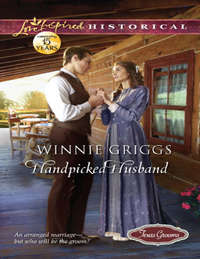
Полная версия
The Bride Next Door
“I’m going to set up my business here.”
Not the answer he’d expected. “What kind of business?”
From the look she gave him, he surmised some of his displeasure had come through in his tone.
“Well,” she replied, eyeing him carefully, “I eventually want to open a restaurant.”
She was just full of surprises. “You know how to cook?”
Her brown eyes narrowed, and her smudged chin tilted up. “You don’t have to say it like that. I happen to be a great cook—everybody says so.”
Just who did everybody include—her father and dog, perhaps? Then he took a very pointed look around him. “A restaurant—in here?”
“Of course I won’t be able to open it right away.” Her voice was less confident now. “I’ll need to earn some money first so I can fix this place up and furnish it proper. And of course I’ll need to buy a good stove.”
She didn’t seem particularly daunted by the task ahead of her. “And how do you intend to do that? Earn the money, I mean.”
She shrugged. “I’m not my father’s daughter for nothing. I’ll figure something out.”
Her father’s daughter—did that mean she planned to try her luck in the poker game over at the livery?
She rotated her neck, and Everett saw signs of fatigue beneath her bravado. For the first time, he wondered about the particulars of her arrival. “If your father didn’t come back to Turnabout with you, how did you get here?”
“I walked, mostly.” Then she grinned proudly. “Made it in three days.”
Her father had allowed her to take a three-day journey alone and on foot? Everett felt incensed on her behalf. Had the peddler given any thought at all to what might have happened? The man should be thoroughly trounced.
A suspicious rumbling from the vicinity of her stomach brought up another question. When had she last eaten?
The faint pinkening of her cheeks was the only acknowledgment she made of the unladylike noise. “Right now, though,” she said quickly, “I’m just going to clean up a spot where I can spread my bedroll and get some sleep while I wait for the sun to come up.”
He looked around at the layers of dust and the lack of useable furnishings. “You plan to sleep on the floor?”
“I don’t see any fancy beds in here. Do you?” Her cheerful tone lacked any hint of self-pity. “Besides, I’ve bedded down on worse.” Her pleased-with-herself grin returned. “And being as it’ll be my very first night in my very own place, I expect I’ll sleep very well.”
She placed her hands on her skirt and levered herself up. “I’m sorry I disturbed your sleep, and I thank you for checking in on me, but you can go on back to your place now. I promise Kip and I won’t be disturbing you anymore tonight.”
Apparently feeling she’d dismissed him, she turned and started picking her way across the room.
Everett contemplated her words while he watched her limp toward a relatively uncluttered spot near the wall that adjoined his place. Her state of affairs wasn’t really any of his concern, and she’d just made it abundantly clear she felt the same. She seemed content with her circumstances, and he had a busy day planned for tomorrow, so he should return to his bed and try to get what sleep he could before sunup.
But for some reason, he stood there a moment longer, watching her. His thoughts turned unaccountably to Abigail, his fifteen-year-old sister. What if she were in this situation? Which was a ridiculous thought, of course. Abigail was safely ensconced in a nice boarding school in Boston and would never find herself in a situation like this.
Still...
* * *
Daisy frowned as she heard her visitor—or was it intruder?—leave. For all his fine airs, he could be mighty rude. He’d all but said he didn’t believe her claim to being a good cook, and it was obvious he didn’t think she’d be able to open her own restaurant. And if that wasn’t bad enough, she’d seen the way he looked down his nose at her.
Reminded her of Grandmère Longpre—one was always aware when she was displeased. Of course her grandmother would never dream of being impolite. The niceties of civilized society were too important to her.
Ah, well, Mr. Fulton didn’t really know her yet, and she’d just roused him from his sleep. She couldn’t really blame him for being in a bad mood. And she shouldn’t forget that he had helped her out from under that shelving, so she should be grateful and more forgiving. As her father would say, never moon over should bes when your have nows are enough to get you by.
She’d just have to prove to Mr. Fulton and the rest of the townsfolk that she aimed to be a good, neighborly citizen of this community. Starting with making this place clean and inviting. Too bad she didn’t have a broom and mop yet. She’d need to take care of that first thing in the morning. For now, she’d just make do as best she could.
She maneuvered an empty crate next to the space where she planned to place her bedroll, wincing at the bit of noise she made. Hopefully it hadn’t been loud enough to disturb her neighbor. Again.
Once she had the crate in place, she eyed it critically, then nodded in satisfaction. “This’ll make a fine table for now—just right for setting my lamp and Mother’s Bible.”
Kip answered her with a couple thumps of his tail.
She decided her change of clothing and the rest of the meager belongings she’d brought along with her could stay in her pack until she found an appropriate and clean place to store them.
She arched her back, trying to stretch out some of the kinks. Tomorrow she’d give this place a good scrubbing, and maybe pick some wildflowers to add a bit of color. It would take a while to fix it up the way she wanted, but the cleaning and scrubbing part didn’t cost anything except time and effort.
Already, she could picture it the way she would eventually fix it up—with bright curtains on freshly washed windows and a new coat of paint on the walls. She’d have a roomy pantry and sturdy shelves built in here for all her cooking supplies, and a big, shiny, new stove over on that far wall.
She grabbed her bedroll, still thinking about the red-checkered tablecloths and the ruffled curtains she’d purchase. But before she could get the makeshift bed unrolled properly, her neighbor returned, a scowl on his face. What now?
“Mr. Fulton, I’m so sorry if I’m making too much noise again. I promise—”
He shook his head impatiently, interrupting her apology. At the same time she noticed he was carrying a broom and a cloth-wrapped bundle.
He set the broom against the wall, nodding toward it. “I thought you might be able to make use of this,” he said. Then he thrust the parcel her way. “I also brought this for you.”
His tone was short, gruff, as if he wasn’t happy. Was it with her or with himself? His accent had deepened, as well.
And more important—just what in the world had he brought her?
She gingerly unwrapped the parcel and was pleasantly surprised to find an apple, a slab of cheese and a thick slice of bread inside. “Why, thank you. This is so kind of you.”
He waved aside her thanks. “It’s just a few bits left over from my dinner.” He nodded toward the broom. “And that’s just a loan.”
That might be true, but the food seemed a veritable feast to her, and the broom would cut her work tonight in half. “Still, it’s very neighborly.” Just saying that word cheered her up.
But he still wore that impatient scowl. “Yes, well, I’ll leave you to get settled in.” He glanced at the sleeping area she’d set up and then back at her. “See that you keep the noise down.”
She smothered a sigh, wondering why he had to spoil his nice gesture with a grumpy attitude. “Of course. Good night.”
“Good night.”
As she watched him leave this time, her smile returned. Regardless of his sour expression, Mr. Fulton had been quite kind. Perhaps she’d already made her first friend.
Bowing her head, she said a quick prayer of thanks for the unexpected meal, and for the man who’d given it to her.
Then she looked down at Kip as she broke off a bit of cheese to feed him. “Look here, boy. We have a nice meal to help us really celebrate our first night in our new home. Isn’t God good?”
And, much as he tried to hide it, she was beginning to believe Mr. Fulton had some good in him, as well.
* * *
The next morning, as Everett prepared his breakfast, he could hear the sounds of his new neighbor’s renewed efforts at cleaning out her building. He certainly hoped she didn’t keep that racket up all day. Besides, did she really think she could single-handedly turn that musty, junk-cluttered place into a working restaurant?
Glancing out his window, he saw a pile of rubbish in their shared back lot that hadn’t been there yesterday. He rubbed his jaw, impressed in spite of himself at the amount of effort she’d already expended this morning. Apparently, she planned to try to make her ambitious but improbable dream a reality.
As he stuck a fork in his slightly overcooked egg, he wondered how she’d fared after he left her last night. Had she gotten any sleep at all given her less-than-ideal accommodations?
He took a sip of coffee. Perhaps he should go over and check on her this morning. Not that her welfare was his concern, but she didn’t seem to have anyone else to look out for her. And, even if it was confoundedly inconvenient, someone should make certain her ankle wasn’t any worse this morning and that she had something to eat.
When he carried his dishes to the counter he spied her through the window, dragging another load of debris to toss on her trash pile. That unfortunate-looking mutt she’d had with her last night was racing from her heels to the far end of the lot and back again.
At least she didn’t seem to be favoring her left foot. As for food, he waffled a few moments over whether to involve himself further in her business. He supposed, as long as he made it clear he expected her to fend for herself going forward, it wouldn’t hurt to offer sustenance one more time.
He’d do the gentlemanly thing and invite her up for something to eat, or at least a cup of coffee. And maybe see if she was as optimistic about her enterprise this morning as she’d been last night.
But before he could act on his decision, he saw her reappear carrying a sack and head toward the edge of town, the dog trotting beside her.
What in the world was she up to now?
Feeling slightly deflated, Everett washed his dishes and headed down to his office. Enough of this unproductive preoccupation with his neighbor. He had work to get to.
But over the next few hours he had trouble focusing on his work. He found his thoughts drifting to speculation as to where she’d gone off to and, to his irritation, caught himself listening for her return.
He supposed it was only natural to worry about any unprotected female heading out on her own in unfamiliar surroundings. No matter how far she’d walked to get here.
Everett was finally rewarded a couple of hours after her departure by the sound of her return. Minutes later, he could hear items being moved around and other evidence of her renewed efforts. Did she plan to work the entire day? He even thought he heard snatches of some cheerful but slightly off-key humming a time or two. It appeared that, no matter what other qualities Miss Johnson might have, she wasn’t afraid of hard work.
And apparently, word of the new arrival had spread through town. There was a steady parade of folks strolling past his glass-fronted office, and stopping by his neighbor’s place. With all the interest Miss Johnson was garnering, he wondered just how much work she was actually managing to get done.
He resisted the urge to walk over and see for himself. The impulse had been born of his desire to check on how she was faring after last night’s rough start, but she apparently had plenty of drop-in visitors to assist her now.
Near noon, Everett was on his knees in front of his type cabinet, picking up the bits of type that had scattered when he dropped a tray. He blamed the incident on Miss Johnson, or rather the bothersome distraction she’d become. That and his interrupted sleep last night—also her fault—were the most likely culprits for his lack of focus today.
All he needed was an uninterrupted night’s sleep tonight; then he’d be as efficient as ever tomorrow.
He was just putting the last piece back in place when his office door opened. He glanced up to see Adam Barr, one of the three men who’d traveled with him from Philadelphia to Turnabout last summer.
Everett pushed to his feet, at the same time pushing away his faint disappointment. He took a moment to slide the tray back into place and then greeted his visitor.
“You’re early today,” he said as he grabbed a rag to wipe his hands. Most days, Adam stopped by on his way back to the bank after having lunch at home with his wife, Reggie. He and Adam had an ongoing chess game that they both enjoyed and took quite seriously.
“Reggie has my afternoon planned out for me,” Adam responded. “Jack’s seventh birthday is tomorrow, and she wants my help planning a small surprise for him.”
Jack was Reggie’s nephew, and she and Adam had adopted him after their marriage last fall.
Adam headed toward the chessboard that was set up on the far end of the room with their game. “If I remember correctly, it was my move.”
Everett followed him. “It was. And I’m looking forward to seeing how you’ll answer my last move.”
Adam sat down, studying the board. “I hear you have a new neighbor,” he said as he fingered one of the pawns he’d captured.
“Word gets around fast. If you haven’t heard a name yet, it’s Daisy Johnson. You remember her—the daughter of the peddler who was arrested for stealing the money from the fair last year.” Adam had been instrumental in getting the man cleared of the charges.
“Falsely arrested,” Adam corrected. “Yes, I remember her. Spirited young lady, if I recall.”
Everett agreed with that assessment but decided to change the subject. “So how is Reggie faring?”
“As stubborn as ever. She refuses to accept that she needs to curtail her more vigorous activities until the baby comes.”
Adam set down the captured pawn and slid his bishop across the board. “There,” he said as he stood. “That should keep you busy for a while.”
Before Everett could study the move, the door opened and in came his new neighbor, carrying the broom he’d loaned her last night, and a small parcel.
While she still wore a dress that had seen better days, there was a pleased-with-the-world smile on her face that overshadowed her dearth of fashion sense. From the bounce in her step it appeared she’d managed to sleep just fine last night. There was no hint of cobwebs in her hair this morning; rather, it was well combed and neatly pulled back in a loose bun.
And, like a shadow, her dog was once more right beside her. In the daylight, the animal looked only marginally more presentable than he had last night. Black and white with a shaggy coat, the mutt had obviously led a less-than-pampered life. One ear was torn, and there was an old scar on one hind leg. And if Everett wasn’t mistaken, the dog had one blue and one brown eye. Very disconcerting.
He took all that in within the few seconds following her entrance. It was the reporter in him, trained to notice even the smallest of details.
That quickening of his pulse—that was due to nothing more than curiosity as to what had brought her to his office.
Chapter Three
Daisy paused when she saw that Mr. Fulton wasn’t alone. “I’m sorry. I didn’t realize you were busy.”
Mr. Fulton’s visitor turned, and she smiled in recognition. “Mr. Barr! How nice to see you again.”
Adam executed a short bow. “The pleasure is mine. I understand you’ve decided to take up residence in our fair town. Let me add my welcome to the others I’m sure you’ve already received.”
Now this welcome seemed genuine. “Thank you. I’m looking forward to setting down roots here.” The idea of finally having a permanent home was more than enough to carry her through all the work ahead of her.
“I’m sure I speak for my wife as well as myself when I say we’d be pleased to have you join us for supper one evening when you’re available.”
Her cheeks warmed in pleasure. “Why, thank you. I’d like that.”
“Be sure to let me know if you need help getting settled in.” Then Adam turned back to Everett. “It’s time I headed home. I’ll be back tomorrow, same time as usual, to see if you’ve figured out your next move.” He tipped his hat her way. “Enjoyed seeing you, Miss Johnson. Good day.”
Once he’d departed, Daisy felt her smile grow a bit more forced.
Which was totally unfair. After all, Mr. Fulton had been more than kind to her last night—in his own way, of course. But it was hard to remember that kindness when his disapproving demeanor reminded her so much of her grandmother.
“I don’t allow animals in my office,” he said stiffly.
He certainly wasn’t making it easy for her to remember his kindness. “I gave him a bath out by the stream this morning.” She did her best to keep her tone light. “And I assure you he’s very well-behaved. So he won’t leave tracks on your floor or bother any of your things.”
“Nice to know, but I still don’t allow animals in here.”
She sighed, then looked down at Kip. “You heard the man, boy. You’ll have to wait outside.” She opened the door and, meeting the animal’s gaze, tried to smile reassuringly as she pointed to the sidewalk. Kip, tail drooping, slowly exited. “I won’t be long.”
She turned back to Mr. Fulton and had to rein in the urge to glare outright.
But he apparently had no idea what she was feeling because he wore that infuriatingly condescending look on his face.
“You talk to that animal as if he understands you,” he said.
“Because he does.” She lifted her chin. “If not the words, then at least the feelings behind them. Dogs are smarter than most folks give them credit for.”
Mr. Fulton strode forward. “I trust your foot is better this morning?”
The thoughtful question put her more at ease. “Yes, thank you, good as new.” Then, remembering her reason for coming over, she thrust out the broom. “I wanted to bring this back in case you were needing it. I sure appreciate you loaning it to me. There was a wagonload of dirt that needed sweeping out of that place.”
He accepted the cleaning implement and set it against the wall. Then he waved her to a chair in front of his desk. “So you’re finished cleaning.”
If only that were true. “Afraid not. It’s going to take more than one day to take care of all that needs doing. But I made a good start.” She took the seat he’d indicated.
“I saw you heading out for a walk this morning,” he said as he took his own seat. “Checking out what our town has to offer?”
Had he been spying on her? “Actually, I went out and gathered up the materials to make my own broom. There’s still a lot of cleaning to do, and I didn’t want to wear yours down to a nub.” She smiled. “Besides, me and Kip needed to get out in the fresh air and sunshine for a bit after stirring up all that dust and dirt this morning.”
He raised a brow. “You’re making a broom.”
Why did he sound so surprised? “It’s not difficult. The hardest part is finding a stick that’s straight enough and sturdy enough to serve as the handle.” She’d learned to be resourceful, not to mention frugal, in the time she’d spent traveling with her father.
Then she remembered the other reason she was here. “I spotted some dewberry vines out behind the schoolyard when Father and I were here before.” She smiled, pleased with herself. “’Course, most of them won’t ripen for another week or so, but there were some that were ready to pick. I gathered up a bunch and they made for a right tasty breakfast.”
Something flickered in his expression, but she couldn’t quite read what it was. Not that it mattered. She handed him the cloth-wrapped bundle. “And I brought you some, as well.”
He didn’t seem particularly eager as he accepted her gift.
“I assure you that wasn’t necessary,” he said. “All I did was loan you a broom.”
“And brought me supper last night.” Daisy watched him unwrap the cloth. “Anyway, it’s not much. But they are quite tasty.” She didn’t believe in not returning favors. “Thank the good Lord there’s a plentiful crop of them this year.”
He stared at her offering for a moment without saying anything. Was something wrong?
“It’s quite kind of you,” he said, finally looking back up. “But shouldn’t you keep them for yourself?”
Was he feeling sorry for her? That wouldn’t do at all—she wanted friendship and respect, not pity. “Don’t you like dewberries?” She couldn’t quite keep the starch out of her tone.
“I don’t believe I’ve ever tasted them. It’s just—”
“Then it’s settled,” she said firmly. “I can pick more when they ripen—the vines are thick with them.”
Looking for a way to change the subject, she blurted out the first thing that came to mind. “Do you have any idea what sort of business used to be in my place?”
“I haven’t a clue. Someone who’s been in Turnabout a lot longer than I have could probably tell you.”
That confirmed something she’d already guessed. “So you’re not from around here?”
He spread his hands. “I’ve only settled here recently. I lived in Philadelphia before that.”
“Philadelphia. That’s over on the east coast, isn’t it?”
He nodded. “It is.”
She’d seen a map of the entire country once, and the east coast seemed a far piece from Texas. “So how’d you end up way out here?”
His expression closed off again. “Just looking for a change of scenery.” He straightened a few papers on his desk. “So what do you have left to do?”
Had she gotten too nosy? Curiosity was a weakness of hers. “I’ve sorted through most of the furnishings downstairs, but I’m sorry to say most of what was in there wasn’t fit for anything but firewood. There were a few pieces worth salvaging, though. And I found an old bed frame upstairs that’ll be good as new once I get some new rope to string it with and some ticking. I figure I can collect some straw and then stuff me a fresh mattress. Before you know it, I’ll have a proper bed to sleep on.”
He shifted in his chair when she mentioned her bed. Her grandmother would chide her for being so indelicate.
She’d best change the subject again. “Do you know of anyone looking for help? I need to find a way to earn some money.”
He leaned back in his chair. “What kind of work are you qualified to do?”
Something about the way he asked the question got her back up. “I can cook, clean, do laundry—I’ll take just about any honest labor I can find. I’m not afraid of hard work or of getting my hands dirty.”
“I haven’t heard of anything, but you might want to check with Doug Blakely over at the mercantile. His store seems to be a gathering place for most of the townsfolk, so if anyone’s looking, Doug’s probably heard about it. In the meantime, how do you plan to get by?”
Now who was being nosy? “Don’t you worry about me. I have a roof over my head, and I know how to live off the land when I need to. Besides those berries, there are plenty of edible roots and plants around here if you know what you’re looking for.”
“You can hardly live entirely on berries and roots for very long.”
A gent like him probably didn’t have any idea what it meant to go hungry for days at a time. “You’d be surprised what a body can live on when one has to. I also plan to set me up a little kitchen garden out behind my place. I’m especially eager to plant some herbs. Not only will they add flavor to my meals, but I use some in my concoctions.”
“Concoctions?”
“Yes. I make balms and potions to keep on hand for cuts and burns and such. Father calls them my concoctions.”
“And is that something you sell?”
“Oh, no. It’s mostly for personal use, though I’ve given some away when I saw a need.” She lifted her head proudly. “Some of those folks have asked to buy more from me, though.” She shrugged self-consciously. “But I don’t really feel right taking money for healing potions.”








